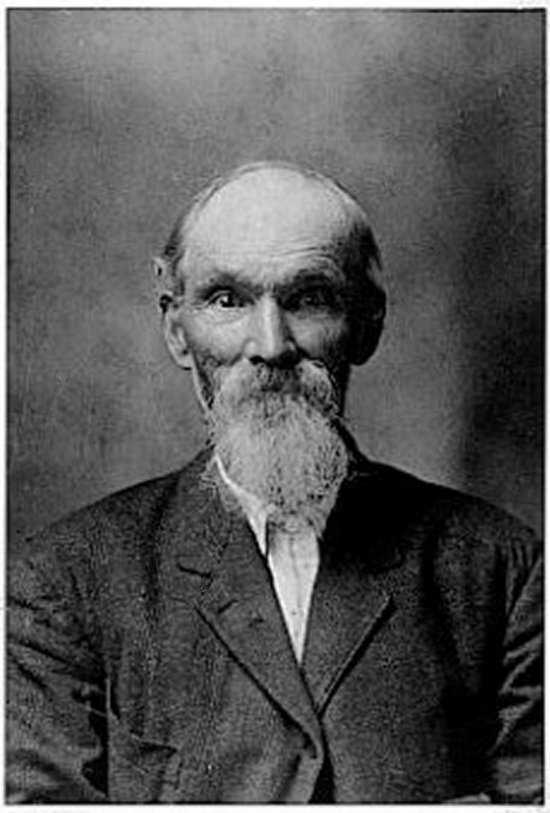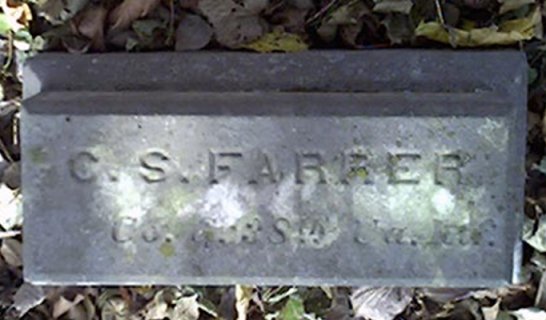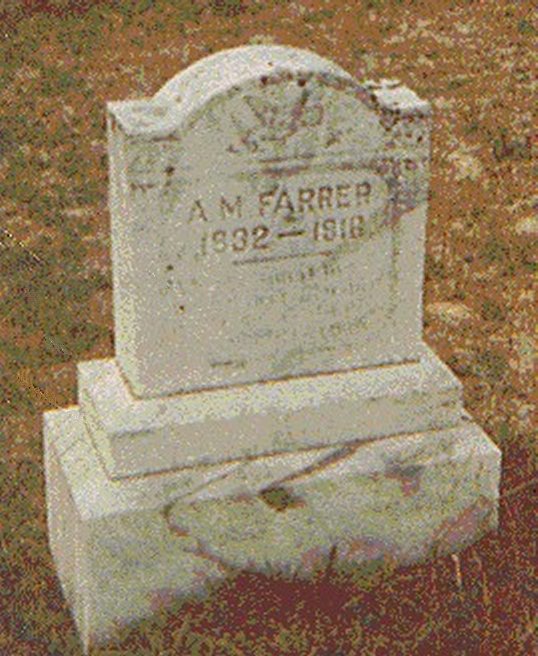Do you have a photo of this soldier? Do you have a bio of your ancestor who served in the 38th Ga.? If you send it, I'll post it here. Please email me at dnichols16@cox.net.
---------------------------------------------------------

Private Aguilla M. Farrer, post war photograph
Three Farrer brothers served in Company G, THE BATTEY GUARDS and were the sons of James H. Farrow:
1. Aquilla Farrow/Farrer enlisted as a private on 1 Oct 1861 at Augusta GA in the 38th Georgia Infantry, Company G, also known as the Jefferson County "Battey Guards." He fought at: Gaine's Mill on June 27, 1862; Malvern Hill on July 1, 1862; Cedar Mountain on August 9, 1862; Rappahannock Station on August 23, 1862; Second Manassas on August 28-30, 1862; Chantilly on September 1, 1862; and Harper's Ferry on September 12 - 15, 1862. At Sharpsburg on September 17, 1862 Aquilla was wounded. At Sharpsburg the 38th held their line in the center of a blood soaked cornfield
With his wound it is not certain if he fought at Botler's Ford on September 19, 1862. At Fredericksburg on December 13, 1862, the men stained the new fallen snow red with their blood to retake a portion of the collapsed Confederate line. He was furloughed from February 19 to March 13, 1863 at Indulginia. He fought again at Chancellorsville on May 1-4 1863; Second Winchester on June 14 - 15, 1863; and Gettysburg on July 1, 1863. He was wounded in the hip during the first day of fighting at Gettysburg and captured during the retreat at South Mountain MD on July 5. Admitted with Typhoid Fever at the USA General Hospital, Fredrick MD on July 6. Transferred to Annapolis MD on the July 7. Confined at Fort McHenry MD on July 9. Transferred to Fort Delaware, DL on July 12. Like Andersonville, Fort Delaware wasn’t designed to take a fraction of the prisoners. Some officers were even shipped out by the Union forces and used as human shields to keep confederate forces from returning artillery fire at Charleston Harbor. Conditions at the Fort were so bad that many prisoners died. Records show the while a POW at Fort Delaware Aquilla had 4 hospital admissions:
August 1-26, 1864 27 day stay length 140 days until next stay
January 13-23, 1865 11 day stay length, 002 days until next stay
January 25-31, 1865 07 day stay length 024 days until next stay
February 24- March 7, 1865, 12 day stay length, 57 days total
As part of a prisoner exchange he would have been released from Fort Delaware, DL some time in February 1865 but he was in the hospital. He was released from the Fort Delaware hospital and exchanged on March 7. He was probably not completely well when he was released from the hospital because he was admitted at Wayside or General Hospital No. 9 in Richmond VA on March 11 and then furloughed for 30 days on March 15.
The surrender at Appomattox Court House was on April 9, 1865, so before his furlough ended the war was over. From the 1,200 brave souls that left to go to war and served in the 38th Georgia Infantry, only 105 remained to see the surrender. I am not sure if Aquilla would have been counted in this group, as he wouldn’t have made it back to his company before the war ended. Having spent almost 6 weeks in hospitals since the first of the year, Aquilla probably wasn’t in very good health. He was probably bare footed, without a horse or weapon. In this condition and under these circumstances the 600 to 700 mile walk home from Richmond VA to Louisville GA may have taken until June or July 1865.
2. Farrer, Garvin H. (or Farrow) (Gavin Hamilton Farrer) - eenlisted on 1 Oct 1861 at Augusta Georgia as a private in the Confederate Army in Company G also known as the Jefferson County "Batteys Guards" of the 38th Infantry Regiment Georgia. He fought at: Gaine's Mill on June 27, 1862; Malvern Hill on July 1, 1862; Cedar Mountain on August 9, 1862; Rappahannock Station on August 23, 1862; Second Manassas on August 28-30, 1862; Chantilly on September 1, 1862; Harper's Ferry on September 12 - 15, 1862; Sharpsburg on September 17, 1862; Botler's Ford on September 19, 1862; Fredericksburg on December 13, 1862; Chancellorsville on May 1-4 1863; the Second Winchester on June 14 - 15, 1863; Gettysburg on July 1-3, 1863; Bristoe Campaign on October, 1863; Mine Run Campaign on November 12, 1863; Morton's Ford on January 1, 1864; Wilderness on May 5 -6, 1864; Spotsylvania Court House on May 8 - 21, 1864; North Anna on May 23 - 26, 1864; Cold Harbor on June I - 3, 1864; Lynchburg Campaign on June, 1864; Monocacy on July 9, 1864; and the Third Winchester on September 19, 1864. He was mortally wounded on September 19, 1864 at Winchester, Virginia and died of the wounds on September 23, 1864 in Woodstock, Shenandoah County, Virginia. He was survived by his wife Sarah Jane Johnson Farrer and children Isaac Marvin, Marcus T. or F., Mary Elizabeth N. and Jefferson H. Between 1864 and 1870 Sarah Jane Farrer remarried an unknown Smith who died before the 1870 census.
He is buried at Massanutten Cemetery, Wookstock, Va. This Cemetery was created around 1898 and about 70 Confederates soldiers who had died during the war were disinterred and reburied here the following year, stone located on Holly Circle, incorrectly reads C. S. Farrer, 38th Va.

Tombstone of Garvin H. Farrer
3. Farrer, William Harrison (William J. Harrison Farrow) enlisted on 1 Mar 1862 as a private in the Confederate Army in Company G also known as the Jefferson County "Batteys Guards" of the 38th Infantry Regiment Georgia. During his basic training at camp near Savannah Georgia he contracted measles. To recover from the measles he was sent home on furlough. Just 19 days after his enlistment William died of pneumonia at home on 20 March 1862. On the same day, his wife, Catherine Wasden Farrer was giving birth to their daughter and only child, William Catherine Farrer.
Aquilla M. Farrer was the only one who survived the war. He was the patriarchal figure for Garvin's children. Aquilla died on the 10th day of March 1916, at the age of eighty-seven years. He did not die in Bartow County, GA, but near the town of Bartow, in Jefferson County, Georgia.
In the late 1970's I met and interviewed Walter I. Farrer the grandson of I.M. Farrer and son of Walter W. Farrer. Walter I. was 7 years old at the time of Aquilla's death and remembers the funeral. He said that Aquilla had stayed with them but died at the home of John D. Scruggs, Aquilla's nephew and the son of his sister Harriett P. Farrow / Davis / Scruggs and William Gross Scruggs. He also remembered going with his father to pick-up Aquilla's sons Joshua Key Farrer, Noah Smith Farrer & grandson William Sidney Farrer at the Louisville train station and taking them to Aquilla's funeral. Josh was my great grandfather & Sid was my grandfather. Another tie to John D Scruggs is that Aquilla was buried in the Moxley Baptist Church Cemetery in the John D. Scruggs family plot. Walter W. Farrer's family plot on the other side of the same cemetery.

Garvin Hamilton Farrow was born on 4 Nov 1827 in Jefferson County, GA.
Aquilla M. Farrow was born on 10 Apr 1834 in Jefferson County, GA.
William J. Harrison Farrow was born on 9 Oct 1840 in Jefferson County, GA.
Photo and bio courtesy of Mr. Lynn Farrer, descendant.